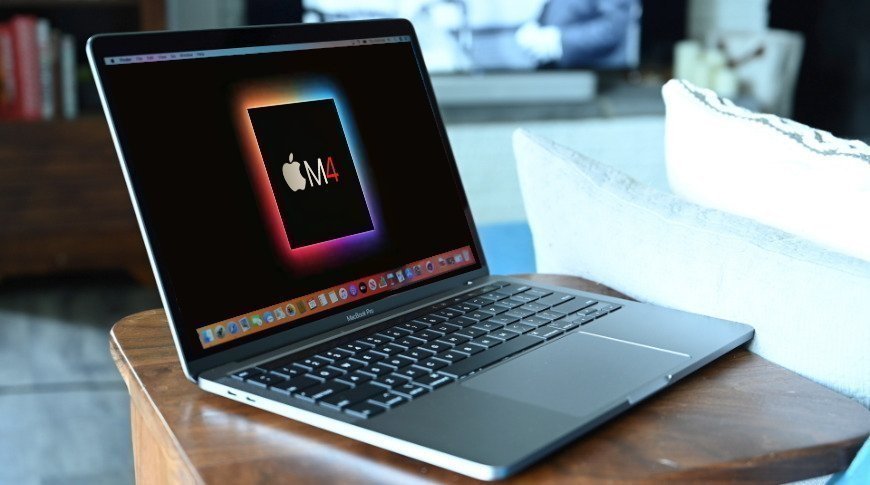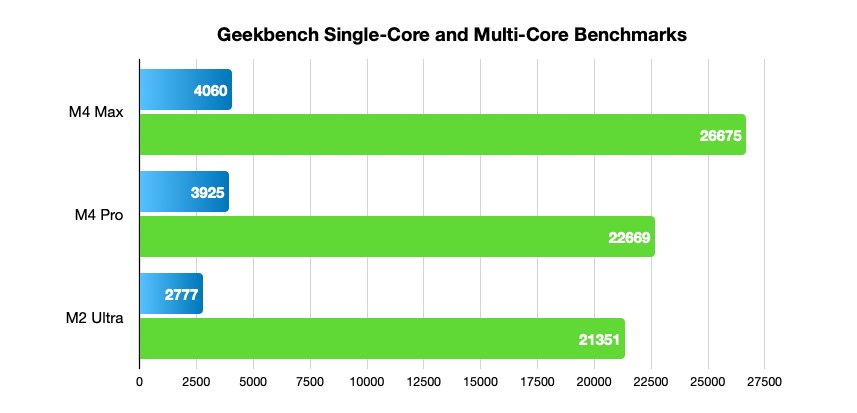First M4 Max benchmark tears apart the M2 Ultra Mac Studio
The M4 Max is the most powerful chip in Apple's collection, with an early benchmark showing the MacBook Pro leaving the Mac Studio or Mac Pro with M2 Ultra in its dust.

The MacBook Pro line now includes M4 Max chips
Late on Thursday, supposed benchmarks for the M4 Pro surfaced on Geekbench, seemingly showing that the M4 Pro is an extremely powerful chip. On Friday, benchmarks for the M4 Max have practically cemented the M4 range's status as the most powerful chips Apple's ever made.
The benchmark for the Mac16,5, a 16-inch MacBook Pro, appeared in the Geekbench results browser early on Friday morning. The listing states it uses an M4 Max chip with 16 cores, divided into 12 performance cores and four efficiency cores, and a clock speed of 1.5GHz.
The main figures for the listing say the Mac scored 4,060 for Geekbench's single-core test, and 26,675 for the multi-core version.

Initial Geekbench scores for the M4 Pro and M4 Max against the M2 Ultra
By comparison, the early M4 Pro results scored the single-core test at 3,925 and the multi-core at 22,669.
Both of these results are much higher than the 2023 Mac Studio with the M2 Ultra. That model is listed with 2,777 for the single-core test and 21,351 for the multi-core, even though the model tested had 24 CPU cores.
As early benchmarks for models that have yet to be released to the public, the figures should be considered with trepidation. It is entirely possible that the numbers are faked or wrong.
That said, they do seem to be fairly realistic and in line with the performance claims Apple has made in its announcements.
As reviewers and other early users get to try out the new Mac models, the multitude of benchmarks will offer a true view of performance improvements.
It does, however, tease at what an M4 Ultra chip could be like. Effectively two M4 Max chips with an interconnect and therefore double the cores, the score should also be about twice as high as the M4 Max.
Read on AppleInsider

Comments
M4 Max = 546 GB/s
M4 Pro = 273 GB/s
M2 Ultra = 800 GB/s
https://browser.geekbench.com/processor-benchmarks
I'm sure NVIDIA GPUs are still faster, but it's a bit more difficult comparing them since they don't really run the same benchmarks. It's also pretty hard to compare AI engines for the same reason.
the Mac mini is now more powerful than the studio?
whaaaaat?
https://browser.geekbench.com/ai/v1/27706
https://browser.geekbench.com/ai/v1/94340
If M4 Ultra doubles the Max and effectively matches a 4090 alongside the fastest CPU and a large pool of high bandwidth memory, the M4 Ultra Studio will be the most powerful lunchbox in the world and pretty competitively priced at $4k.
Why is a 1tb, 48gb M4 Pro Mac Mini more expensive than the baseline price of a current Mac Studio M3 Max (assuming Apple will keep the price the same for M4 Max)?
Because just the difference in RAM but a much more specced enclosure and better chip doesn’t make sense to me.
Enough for me to decide on getting the Pro - while I like the RAM options on the Max, I really love all day battery life.
In addition to that, a cooler laptop also lasts longer, heat kills electronics over time & I live in a hot country too.
My 16" M1 Pro is running fine but I will upgrade to the M4 in the next few months when it becomes available here in SE Asia.
But my question remains - why is the M4 Pro purchase price as mentioned more expensive as what will be the base Mac Studio?
https://browser.geekbench.com/v6/cpu/compare/8593852?baseline=8608283
the only sub-test where the 9950x wins is ray-tracing, because the 9950x has 32 logical (16 physical) cores, and ray tracing scales incredibly well with more threads. But ray tracing is an outlier in that regard. Otherwise, the m4 max wins big.
note that for multithreaded workloads that scale well, AMD’s threadripper and Epyc products are far ahead of Apple because they have a ton of cores. But they are also incredibly expensive and use a lot of power. For example:
https://system76.com/desktops/thelio-mega-r3-n2/configure
you can easily configure a system that costs over $20k with a 96 core cpu.